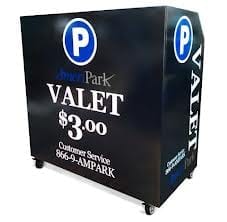
 Recent news stories have shown that municipalities are taking an increasing interest in regulating valet parking companies with specific valet parking laws and ordinances.
Recent news stories have shown that municipalities are taking an increasing interest in regulating valet parking companies with specific valet parking laws and ordinances.
An initiative, spurred by problems with valets parking cars in residential neighborhoods and an unusual amount of theft, was put forward last month by Los Angeles looks would require valet companies to obtain permits and insurance before being allowed to handle customers’ cars.
An Austin Texas initiative is proposing a rate hike on valet companies that use on-street parking space for valet parking.
These two stories are a good reminder that valet companies need to be aware of local valet parking laws and make sure they’re in compliance. Perhaps more importantly, they’re important reminders that working closely with your local municipality and police department is essential to long term success. Local valet parking laws and regulations vary significantly from city to city so you should take the time to contact your local police department and municipal office to make sure your company is in full compliance.
General Valet Parking Laws
While they’re aren’t any universal guidelines, we want to present some things to consider that will serve you well in most circumstances. However, that’s no excuse for not learning the valet parking laws in your area.
Public or Private?
If you’re using public parking spaces or public streets for the parking, standing, and loading associated with valet parking, you’ll almost certainly fall under some sort of local regulations on valet parking. On the other hand, if you operate entirely on private property, like a hotel , you can probably disregard most public ordinances as they won’t apply to you, but it’s worth investigating before doing so as penalties and fines can be significant.
Valet Parking Permits
If you’re going to be using public parking, you’ll almost certainly need to apply for a permit. Before you apply, make sure to have your documentation in order. Though it varies, you’ll probably need to submit documentation including:
- Contact info
- Proof of insurance
- Location and number of spaces required
- Days and hours of operations
- Estimated number of vehicles
- History/Operating Record of your company (looking for a history of burglary, DUI, and accidents)
- Logistics of area (street configuration and potential pedestrian issues)
If you’re using curb space, there is often a fee for each space or linear foot of space used. This can apply both for the actual parking spaces and for the pick-up space depending on local rules. Some areas only require that you submit an application and don’t charge an additional fee, but that’s increasingly rare.
Residential Area Considerations
For special events in more residential areas, make sure you’re conscious of that specific municipalities rules regarding parking. Subrubs can have stricter and more detailed laws regarding how, where, and for how long cars may be parked.
Alternatives to Public Parking
Since valet parking laws and the associated fees can get expensive for using public parking spaces, it’s worth investigating other ways to park vehicles. In our experience, the most effective way of doing this is negotiating with nearby businesses whose schedules offset well with the venue your working at. If you negotiate a private arrangement to use their lot in their off hours, you’ll be able to fall outside public jurisdiction and avoid the associated valet parking laws and fees.
Another way we’ve seen companies handle this is to find a lot farther away and shuttle valets back and forth as needed.
Signange Regulations
Many cities have laws regarding signage that apply to valet companies. With the increasing popularity of neon signs, this becomes particularly important as some cities have strict rules governing how and where these must be used.
In general, we’ve found that valet companies that work closely with their local municipality and police department tend to end up in better shape than those who don’t. They’re able to establish good relationships and show good will that they’re making every effort to comply. That way, even in the event that you’re not in full compliance, you’ll be able to show a strong record of working with and obeying local authorities and may be able to avoid fines or penalties.

